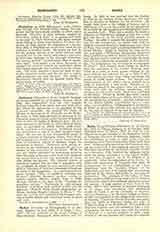

Bachmann (AMNICOLA), PAUL, Catholic theological controversialist, b. at Chemnitz, Saxony, about 1466. His biographical data are very meagre. Nothing is known of his youth, and very little of his life, before his appearance as an opponent of the Lutheran movement. He entered the Order of Citeaux at the convent of Altenzelle on the Mulde. He seems to have been employed as professor in the Cistercian house of studies newly founded at Leipzig. Here he won the degree of Master of Arts. He was made procurator and finally, in 1522, Abbot of Altenzelle, in succession to Abbot Martin (1493-1522). At the outbreak of Lutheranism, Bachmann sprang into prominence as one of its most energetic opponents. He was one of that distinguished group of scholars composed of Cochlaeus, Emser, Peter Forst, and Augustin von Alveldt, who, under the direction of John of Schleinitz, Bishop of Meissen, fought the movement in Saxony. Bachmann gave special attention to the reformation of monastic life and to a defense of the veneration of the Saints. While he was not wholly successful in preventing defection from the ranks of his own order, he at least hindered the secularization of his own monastery of Altenzelle during his lifetime. His vigorous defense of orthodoxy engaged him in a war of pamphlets with the reformers, in which his own contributions yield little in bitterness of tone and coarseness of language to those of his antagonists. In a contemporaneous satire entitled “Mors et sepultura doctrinm Lutheranae” (Strobel, Opuscula quaedam satirica et ludicra tempore Reform. scripta, Fasc. 1, 1784, 49 sqq.) written in the style of the “Epistolae obscurorum virorum”, Bachmann is very severely handled. A letter is there ascribed to him over the signature “Humilis frater Paulus Hamnicolus, indignus Abatissa Monstri Cellensis in Misnia”. Besides his controversial pamphlets Bachmann’s writings comprise hymns and devotional works in prose and verse.
MATTHIAS LEIMKUHLER

